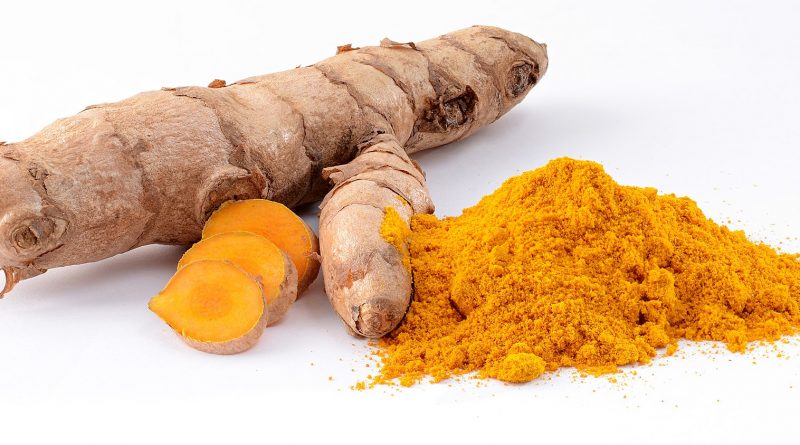Turmeric and Your Dog’s Health

Turmeric – Could this spice help my dog?
Dogs are living longer than ever before in history. Your pup may be enjoying a longer life span but with that can come degenerative and other difficult disease processes. Let’s take a look how a culinary spice has gotten the attention of scientists and veterinarians alike to help tackle the problem of age-related disease.
What is turmeric?
Turmeric is a culinary spice that is common in Indian and southeast Asian cuisine. It is created from the dried root of a ginger-like plant. When ground and placed in a bottle for your spice drawer, it has a brilliant yellow-gold appearance. It is what gives curry its trademark yellow color and has a mild taste that is well-tolerated by dogs and humans alike.
How can turmeric help my dog?
Turmeric has been used for centuries as a part of traditional Ayurvedic medical practices. Ayurvedic medicine is the traditional medicine of India, which incorporates ‘five actions’ for the diagnosis and treatment of ailments, including dietary changes, yoga, massage, acupuncture and herbal medicine.
Turmeric has been used traditionally to help heal wounds and burns (mixed into topical salves), to treat pancreatitis, diabetes, anemia, respiratory disorders and liver disease.
Lately, turmeric has been the focus of medical researchers. Veterinary use has become popular in the past decade – both as topical treatments and for oral use. Turmeric has also been a potential adjunctive treatment for parvovirus in young puppies.
Cancer
Turmeric is a strong antioxidant thanks to its flavonoid component – curcumin. Both turmeric and curcumin extracts are used in dogs as nutritional supplements. Specifically, curcumin can help to slow the growth of tumors and can even help to kill certain cancer cells. It has also been shown to help control the expression of certain proteins that are related to a cancerous process, such as modulating the expression of proteins 5-LOX, TNF (tumor necrosis factor), NF-kappa B, COX-2 and others. These powerful properties can help to slow the growth of cancer or may help to prevent tumors.
In dogs, patients with intestinal cancers or intestinal disease may benefit from turmeric. Using antioxidants like turmeric may help to lengthen your dog’s life if he is fighting cancer. A recent review of 50 randomized controlled human trials or studies reporting use of nutritional supplements with chemotherapy/radiation showed that the patients that took antioxidants and other nutrients had an increased survival rate compared to those that did not. This is promising news.
Holistic veterinarians often recommend adding turmeric to home-made cancer diets. If your pet is being treated for cancer, talk to your veterinary oncologist about a home-made cancer diet recipe or referral to a veterinary nutritionist. Many consultations for dietary therapy can be made via email or internet interface.
Anti-Inflammatory Power
Antioxidants can be powerful anti-inflammatories. The curcumin in turmeric is no exception. Many over-the-counter joint supplements contain turmeric. It can help to reduce inflammation in mildly arthritic joints. More severe arthritis may or may not benefit the addition of oral turmeric.
How do I use turmeric?
Before you start emptying your spice drawer into your dog’s food bowl, talk to your veterinarian. Better yet, if you are interested in holistic and herbal medications like turmeric, seek out a holistic veterinarian. They will be able to best guide you regarding dosing and usage. It may be in your dog’s best interest to use extracts of curcumin instead of the whole ground spice turmeric.
The dosing for turmeric may vary depending on your dog’s particular issue. Many brands of health supplements for joint support, digestive support and cancer support contain lower levels of turmeric.
Giving your Dog Turmeric
If your dog has been prescribed turmeric for a specific disease process or if it is included in an over-the-counter health supplement, give as directed. It is also recommended to give turmeric with a small amount of fat to help improve absorption. For most pets that tolerate fatty foods, a small amount of cheese is sufficient. If your dog has dental disease, specifically problems with the enamel – even a small amount of chipping – can predispose your pet to tooth staining. Eating too much turmeric spice in food can stain tooth enamel.
Talk to your Veterinarian
Always talk to your vet before starting a new treatment – even if it is an over-the-counter herb or supplement. While herbs like turmeric are all natural, they have powerful medicinal properties and may not mix well with other drugs your dog may be already taking.
Resources
- Fougere, B. Popular Thai Culinary Herbs and How They Can Help Companion Animals. World Small Animal Veterinary Association World Congress Proceedings. 2015.
- Wynn, S. Nutritional Alternatives for Cancer Patients. VIN Medical FAQs, updated July 6, 2017.
- Simone CB, et al. Antioxidants and other nutrients do not interfere with chemotherapy and radiation therapy and can increase kill and increase survival part 2. Alternative Therapes. 13(2): 40-46.













